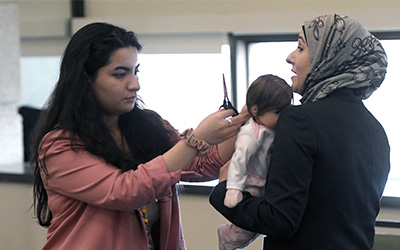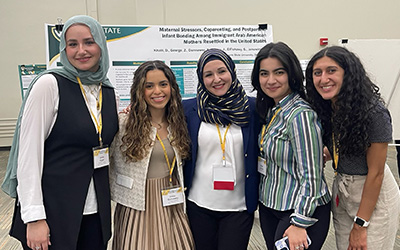Researchers unite to highlight the struggles of Arab American immigrant and refugee mothers and children
"It's not easy being pregnant and having a baby. There are a lot of hormonal changes that affect you psychologically," said Dalia Khalil, Ph.D., RN '17, an associate professor at the Wayne State University College of Nursing. "Add to that being an immigrant or refugee - having no support from friends and family, being relatively alone in a new country - and there are so many more stressors."
These stressors and the mothers and babies they affect are being studied by Khalil's interdisciplinary research team of Wayne State students who, like their subjects, are from Arab American immigrant and refugee families. This research focus is unique as Arab Americans are categorized as white in many databases, including the United States Census, and are often overlooked in health research.
This is an ideal project for Wayne State researchers given the university's proximity to Dearborn, the city with the country's largest Arab American population. There are an estimated 300,000 to 350,000 Arab Americans living in metro Detroit. Khalil said she felt a responsibility to bring attention to resettled families in the area who might be suffering, alone and unknown.

The research is partially supported by the Dr. Judith Fry McComish and Philip A. McComish Endowed Research Fund at the College of Nursing, which promotes study of the socioemotional health and development of vulnerable infants and their families.
An immigrant mother herself, Khalil wanted to learn how relocation during pregnancy can impair the postpartum mother-baby bond. Her multidisciplinary team, well-versed in Arab culture and language, studied 113 immigrant and refugee households, interviewing mothers and assessing the developmental progress of infants and toddlers at single home visits that lasted for two to three hours at a time.
Zinah George '21, a psychology and public health scholar and Iraqi refugee, said the team was positioned for success because of their different academic and ethnic perspectives. The parents of third-year medical student Shirley ElFishawy '21 emigrated from Egypt, the parents of chemistry alumna and graduate student Eman Dannawey '22 emigrated from Kuwait and Liberia, and the family of nutrition and food science student Jenna Hijawi emigrated from Palestine. Additionally, research assistants Noor Abou-Rass and Ibdaa Kojan emigrated from Syria.
Dannawey said the team connected instantly, proud of their different origins and connected by their shared identity, despite being technically non-existent in the categories of several databases.
"Because we have this shared background and the desire to amplify Middle Eastern and North African voices, we felt like we knew each other from day one," Dannawey said. "We're seeing people who are like our parents were 10 to 30 years ago, and a lot of the moms see themselves or their daughters in us."
Unique needs
ElFishawy said she hopes the study illustrates the difficulties occurring with the young families in this population while also illuminating why Arab Americans should be recognized and advocated for as a distinct group. Despite checking the white box, they "have this totally different background."
Before tackling the classification issue, however, ElFishawy said the first step in helping resettled people is to document their everyday struggles. Having escaped troubled circumstances in Lebanon, Iraq and Syria, many immigrants and refugees in the study find themselves struggling financially in America. Families who participated in the study have an average of four children, but 89% earn less than $40,000 in annual household income.
"They don't have the bandwidth right now to worry about spreading awareness of their situation. They just need to make sure that they can get the next meal on the table," ElFishawy said. "We're elevating their voices, and by getting to know their unique needs, we also give them an opportunity to share what they need rather than imposing upon them what we think they need."
One critical need is maternal mental health care, even among more privileged populations, and George said she hopes Arab American refugee and immigrant mothers realize they are not alone if they experience postpartum depression.
"I'd like for the families to be aware of the results and know they're not the only ones suffering from these issues," George said. "Mental health problems are very taboo in Arab culture, and we need to make resources more available for them to better understand themselves."
Only the beginning
Now that the information from the interviews has been collected, Khalil is analyzing the findings and preparing for publication. The researchers who assembled to undertake the data collection process are no longer formally collaborating, but they recently joined together at the College of Nursing Urban Health Conference to present a poster with their preliminary results. The team members were approached by multiple guests surprised about the interdisciplinary nature of the group and curious how the study influenced their view of nursing.

"Being part of this team gave each woman some experience assessing patients the way nurses do," Khalil said. "Nurses look at the whole picture. In addition to paying attention to the physical complaints of the patient, we consider physical, psychological and spiritual aspects that can affect their health."
Khalil said she is planning more research into the experiences of the local Arab American community after this study is complete and said the team members will "each continue to do this work in their own way." George is pursuing a Ph.D., ElFishawy and Hijawi are on the path to becoming physicians, and Dannawey said she enrolled in the master's in chemistry program because she has grown to love research.
"Dr. Khalil always encouraged all of us," Dannawey said. "She's like, 'Go get your Ph.D., go get your master's.' The more I spoke with her and the more I spoke with the moms, I felt even more encouraged to finish my education, obtain my Ph.D. and maybe even apply to medical school in the future."
Khalil said the forthcoming research results are intended to inspire interventions from governments and nongovernmental organizations so that over time the experience of Arab American immigrants and refugees improves. She noted that the study has already assisted families in unexpected ways. By speaking Arabic and even specific dialects, researchers were able to direct mothers to resources including the nonprofit community organization ACCESS (Arab Community Center for Economic and Social Services), the State of Michigan's Women, Infants & Children (WIC) program, Arab American physicians and culturally attuned stores and restaurants.
"I have heard a lot of feedback from the mothers saying they enjoyed being part of this study," Khalil said. "They told us, 'It really made me feel like I'm not alone. It made me feel like people cared about me.'"